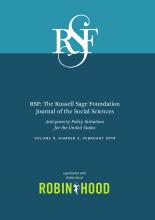Abstract
To address the housing affordability crisis for low-income Americans, we argue for a refundable renter’s tax credit. The proposed credit would be delivered through the tax code, reach a broad segment of renters, and target those with high housing cost burdens. We simulate the effects of the credit using Current Population Survey data. The credit would reach nearly 60 percent of poor renters and more than 70 percent of renters facing severe housing cost burdens, the credit amount averaging $2,059. Among recipients, the credit reduces the poverty rate by 12.4 percentage points and the deep poverty rate by 8.8 percentage points. For those who remain poor, it reduces the poverty gap by nearly a third. The annual cost is $24.1 billion.
- © 2018 Russell Sage Foundation. Kimberlin, Sara, Laura Tach, and Christopher Wimer. 2018. “A Renter’s Tax Credit to Curtail the Affordable Housing Crisis.” RSF: The Russell Sage Foundation Journal of the Social Sciences 4(2): 131–60. DOI: 10.7758/RSF.2018.4.2.07. We thank Meaghan Mingo for superb research assistance and the conference participants, reviewers, and editors for helpful feedback on earlier drafts of this manuscript. Direct correspondence to: Sara Kimberlin at skimber{at}stanford.edu, 450 Serra Mall, Bldg. 370, Stanford, CA 94305; Laura Tach at lauratach{at}cornell.edu, 253 Martha van Rensselaer Hall, Cornell University, Ithaca, NY 14853; and Christopher Wimer at cw2727{at}columbia.edu, 1255 Amsterdam Ave., New York, NY 10027.
Open Access Policy: RSF: The Russell Sage Foundation Journal of the Social Sciences is an open access journal. This article is published under a Creative Commons Attribution-NonCommercial-NoDerivs 3.0 Unported License.






